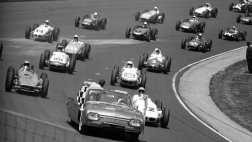When you see a Mercedes 230SL coupe it is still hard to believe that they made their debut way back at the 1963 Geneva Motor Show. When Mercedes Chief Engineer Professor Dr. Nallinger rolled the deep blue covering cloth off the car, the assembled media quickly realised that Mercedes had well and truly left the 1950s behind. For in front of them was a grand touring machine of stunning beauty.
Mercedes had been able to combine power, quality, safety, style and wrap it into one elegant and understated package. If you bought one of these babies back in 1963, you had it all. And if you have one now, you still have it all. The brief given to planners in 1959 was to replaced two cars in the Mercedes range, the famed gull winged and uncompromising 300 SL, which many believed to be irreplaceable (and they were right) and the popular, charming but listless boulevard cruiser, the 190 SL sports convertible.
So, the 230SL was to follow a middle course and designed to be a comfortable high-performance, reliable, two-seater grand touring car with exemplary driving safety. Head of Mercedes styling Fredrick Geiger and designers Paul Bracq and Bela Barenyi got the shape of the 230 fixed by February 1960 and the car was in prototype stage soon after.
This was the first Mercedes to have passive safety engineered into the car and boasted radial tyres as standard. The vehicle body incorporates a rigid passenger cell and crumple zones at the front and rear. It was Bracq and Bareni who devised the car's distinctive, patented, slightly concave hardtop which inspired the "Pagoda" nickname, being reminiscent of Eastern temples. The concave form of the roof also improved passive safety, ensuring greater rigidity at a lesser weight.
In production between 1963 and 1971, the 230SL started with a 2.3 litre six cylinder engine and progressed through 2.5 and 2.8 litre motors. The Pagoda now has a status which very few vehicles are ever are able to achieve. Those in the advertising industry turn to it regularly whenever they want to use a symbol that immediately convey timeless, classic design and high levels of boulevard chic. They made 49,000 of Pagodas and most are left hand drive. Good ones in Australia go for $80,000 and upwards. Keep checking Carsguide!
David Burrell is the editor of retroautos.com.au




.jpg)
.jpg)














.jpg)
.jpg)
.jpg)


.jpg)
.jpg)


.jpg)

Comments